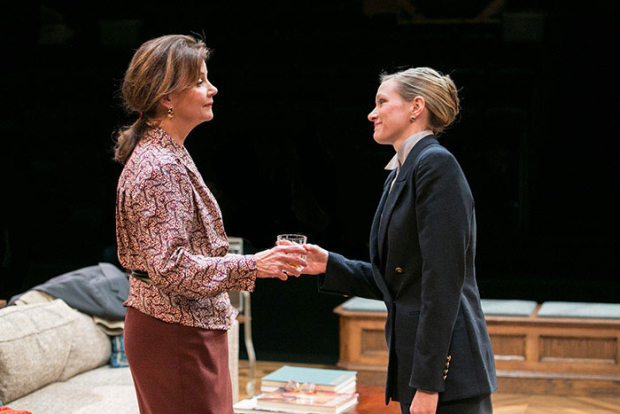The City of Conversation

(© C. Stanley Photography)
Arena Stage's The City of Conversation is the Washington, D.C. premiere of a very intelligent and timely play that reflects, celebrates, and condemns the art of politics. Taking place in Georgetown from the end of the Carter era through the Reagan administration and on to the first inauguration of President Obama, Anthony Giardina's play is told primarily through the perspective of a social manipulator, political influencer, and hostess par excellence named Hester Ferris.
Hester is a modern-day liberal patterned on actual hostesses like Pearl Mesta and Pamela Harriman, women who opened their homes to give storied gatherings, mingling members of the right and left in order to get warring legislators to agree with one another in a private setting, knowing that these agreements would blossom into public accords.
The play begins in the fall of 1979 with Hester preparing for an important dinner, as she calls it, "a little Judiciary Committee thing." Hester still has her hair in curlers and is wearing a robe when her son, Colin, arrives home from London with his fiancée, Anna Fitzgerald. Hester and Anna take an instant dislike to each other. Hester cannot stand Anna's knee-high suede boots and neo-con attitudes. Anna, who is as frank as Hester is imperious, cannot stand Hester's liberalism.
Hester begs Colin not to marry Anna. She can see the future with Anna as her daughter-in-law as a train wreck. But Anna has already convinced Colin that she is essential to his future success. As a result, the two marry and have a son named Ethan, who is 6 years old by the time Act 2 begins.
Hester is superficially a doting grandmother during the days that Ethan spends with her, but privately she continues her love of political wheeling and dealing, carrying on a letter-writing campaign against the appointment of Robert Bork to the Supreme Court, creating a passionate uproar from Colin and Anna. The play ends in January 2009 with the return of Ethan, now a teacher in the Bronx, to visit his grandmother and attend President Obama's Inauguration Ball.
Margaret Colin is excellent as the clever, witty, and elegant redhead, Hester. Colin brings out all the nuances of Hester's complex character, both at the beginning of the play, when she is at the height of her power, and at its end, when her hair might be gray, but her attitude is still feisty.
Michael Simpson performs the roles of Hester's son and her grown grandson well, distinguishing the parts nicely. As Colin, he is antagonized by his mother's ability to control everything from his clothing to the schools he attends, remembering bitterly that while other children were read bedtime stories, he was read "selections from de Tocqueville." As Ethan, he is more relaxed, having found a way to live his own life. Caroline Hewitt is appropriately brittle and manipulative in the role of Anna, a match for Hester in terms of her determination to have her way, whatever the cost.
Ann McDonough is delightful as Hester's sister, Jean, who functions as part-time secretary and babysitter. While she plays Jean as the polar opposite to Hester, McDonough creates a character who is far more perceptive and sensitive than Hester can ever be. Todd Scofield is credible as an obnoxious conservative Kentucky Senator and Jjana Valentiner delivers an outstanding performance as his wife.
Director Doug Hughes keeps the play moving at a satisfyingly brisk pace. John Lee Beatty's set places the characters in a gorgeously appointed Georgetown home, complete with photographs of important political leaders through the ages. Catherine Zuber's costumes perfectly illustrate the change in upper-class women's fashions from 1979 to 2009.
Although the apparent theme of The City of Conversation is Washington politics, it is in fact a play about the larger principles of trust, support, and love. While Colin and his mother can playfully joke about the appropriateness of sideburns in 1979, by 1987 they have seen the destruction that political conviction can have when it is used in one's own family, proving what happens when a house is divided against itself.











